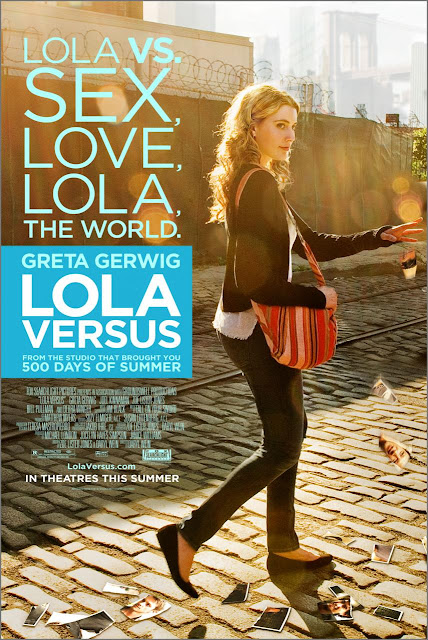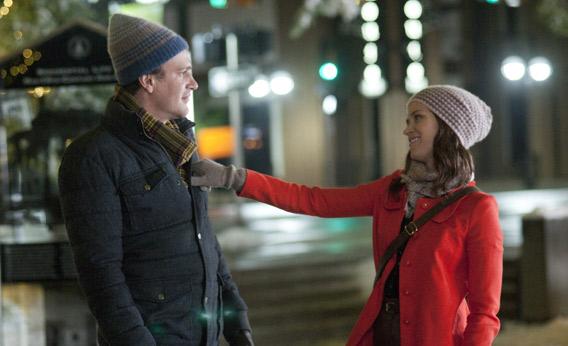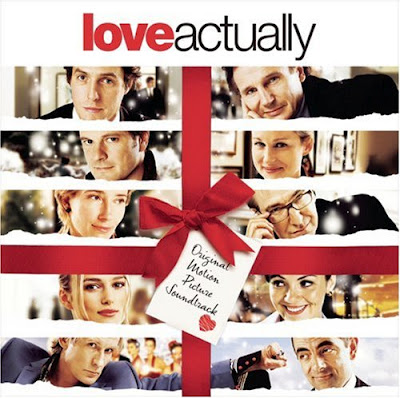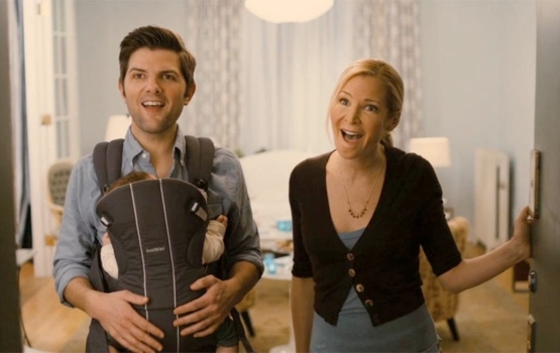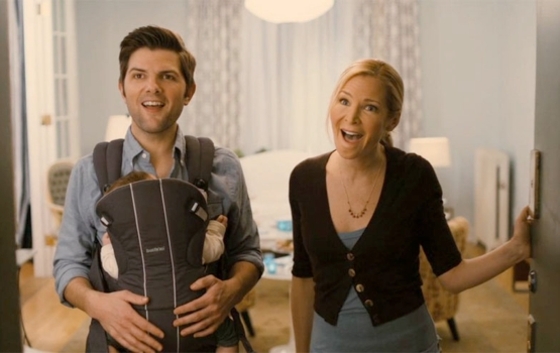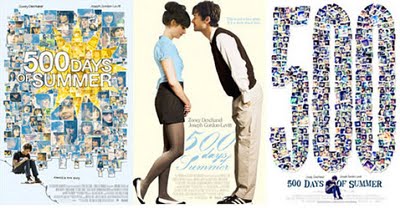Watch Tech Support:
Tag: Romantic Comedy
‘Lola Versus’ Not Your Average Romantic Comedy: Bad Love Life Decisions, Finding Happiness…and One of the Best Film Endings Ever
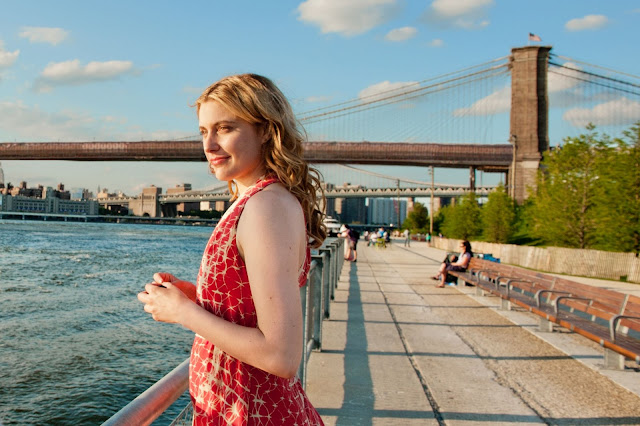 |
| Greta Gerwig as Lola in Lola Versus |
Romantic comedies usually make me want to gouge my eyes out. Now, that doesn’t mean I hate them all. Some of my favorite films are rom-coms. But every now and again, one comes along that entertains rather than enrages me. Following in the footsteps of female-fronted comedies Bridesmaids, Young Adult and Girls (all of which I love), Lola Versus follows a single woman making horrendously bad decisions yet struggling to find her way.
Supporting Lola through her break-up are her best friends supportive Henry (Hamish Linklater, who I will forever think of as Julia Louis-Dreyfuss’ brother on New Adventures of Old Christine) and scene-stealing sarcastic Alice (Zoe Lister Jones, who also co-wrote the script).
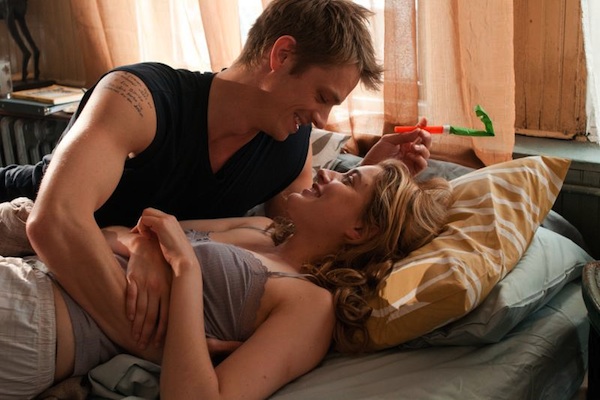 |
| Joel Kinnaman and Greta Gerwig in Lola Versus |
As she tries to move on, we witness Lola ask a man to put on a condom and take a pregnancy test. Not only is it great to see aspects of sex and reproduction. It’s refreshing to see a woman exert her sexuality but not be defined by it merely an object for the male gaze.
While it started off promising, I gotta admit, the bulk of Lola Versus pissed me off. I wanted to shout at the screen, “No, Lola!! Don’t sleep with him!” or “Spend more time with your girlfriends!” or “Don’t believe him that he’s clean…whatever the fuck that means…make him wear a fricking condom!!” or “Stop smoking weed with (and being nice to) your ex-fiancé who dumped you!”
By the end of the film, I realized I wasn’t mad at the movie per se. I was pissed at Lola’s bad choices.
But isn’t that life? Isn’t that what people do when they’re dumped? They obsess over their exes, retracing the steps of their relationship, trying to deciper the clues that led to the relationship’s unraveling. They pine for them. They strategize ways to accidentally run into them (or avoid them like the plague). Either way, there’s a lot of strategizing involved. I wanted Lola to be empowered. To stop obsessing over nice but douchey guys who didn’t appreciate her or who weren’t right for her. I wanted her to hang out with her female friends. But the way the plot unfolded rang more realistic and way more uncomfortable.
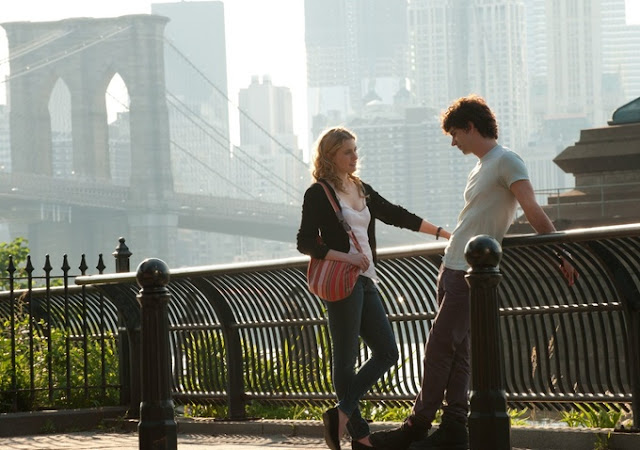 |
| Greta Gerwig and Hamish Linklater in Lola Versus |
In an interview with Collider, Gerwig shared how the script spoke to her because Lola was such a hot mess:
“Sometime female characters, especially in the genre of something that people consider rom-com, make mistakes in a cute way or they’re a mess in a way that’s palatable. I like that Lola is a real mess. She’s making big mistakes and it’s not just cute. It’s destructive and self-absorbed and not awesome and she has to recover from that. She stands to damage relationships around her. Even as this crappy thing happens to her at the beginning of the movie, she uses that as an excuse to behave badly for the next year of her life. I like movies about women behaving badly, because women behave badly just like men, and we’re not always adorable and cute about it.”
Gerwig is absolutely right. Women in film aren’t usually allowed to be messy or unlikeable. Although that’s slowly changing.
Lola Versus made me uncomfortable because it reminded me of too many of the bad decisions I’ve made in my life. Falling back into sleeping with people I shouldn’t. Agonizing and analyzing every single conversation. Calling an ex, desperately hoping to rekindle that spark. Settling for someone not that great in a vain attempt to fill the gaping void that my partner’s disappearance has left.
I eventually stopped all this time-sucking nonsense. I thought by hanging onto relationships, I was boldly forging ahead seeking my happiness. But that’s not what I was really doing. I was placing my happiness in the hands of others. And so was Lola.
 |
| Zoe Lister Jones and Greta Gerwig in Lola Versus |
The movie tackles the topic of single women and aging. As we approach or pass turning 30 (like me!), we contend with societal expectations. Not that turning 30 is some horrible harbinger of doom. Quite the contrary. I’ve been more confident and comfortable in my own skin after turning 30. But it’s still hard to silence the social cues that tell us our lives should fall into place in a certain pattern.
Here’s the thing about Lola Versus. It frustrated me and I rarely laughed out loud. Although the scene where she screams at the party…priceless. But Gerwig mesmerized me and the film enthralled me. It passes the Bechdel Test (yay!!!). And it boasts one of the absolute best endings I’ve ever seen in a film. Ever.
In every romantic comedy, it’s all about two people getting together in the end. Or if it’s really radical — and trust me, I use that term facetiously — they’re already together in the beginning and it’s about the two lovers facing obstacles but ultimately staying together. The only rom-coms I can recall that deviate from this predictable paint by numbers path are Annie Hall, The Break-Up and Kissing Jessica Stein.
I don’t want to spoil the ending. But I will say this. (Aver your eyes if you want to be completely surprised) Lola achieves happiness, something that had eluded her all along. She suffered writers’ block, not being able to silence the voices and noises in her head — ironic since her dissertation was analyzing silence in film — but now she could write again. She became happy with who she was and with her life.
And it had nothing to do with a man.
Now that doesn’t mean she says fuck you to all her relationships. While she knew how to love other people, she didn’t know how to love herself, a lesson most of us need to learn.
Lola talks about Cinderella with her mom (Debra Winger…so glad to see her in more films!). She tells her that she liked Cinderella as a kid but how fairy tales are toxic, teaching girls to wait for a man to sweep them off their feet and give them shoes. Fairy tales set women up for failure. We put these unrealistic expectations on love and romance. Now, I’m not arguing for settling, not by any means. But fairy tales teach girls that when they grow up, they should wait around for men; that they should put romantic relationships before everything else in their life even sacrificing themselves. Lola realizes that she must navigate her own happiness rather than relying on a man or some lofty romantic fairytale.
Too many romantic comedies subject women to stereotypical gender roles. Needy, passive, just out to find a man. Can’t romantic comedies be intelligent? Can’t they highlight the importance of female friendship too?? Yes, yes they can. And Lola Versusdoes.
One of my favorite lines in the film is when Lola says:
‘The Five-Year Engagement:’ Exploration of Gender Roles & Lovable Actors Can’t Save Rom-Com’s Subtly Anti-Feminist Message
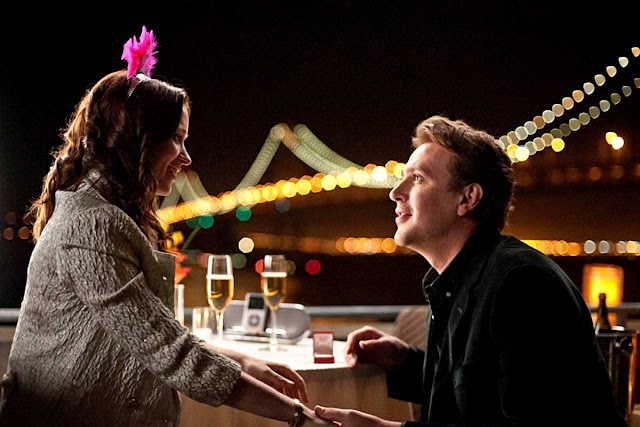 |
| Violet (Emily Blunt) and Tom (Jason Segal) |
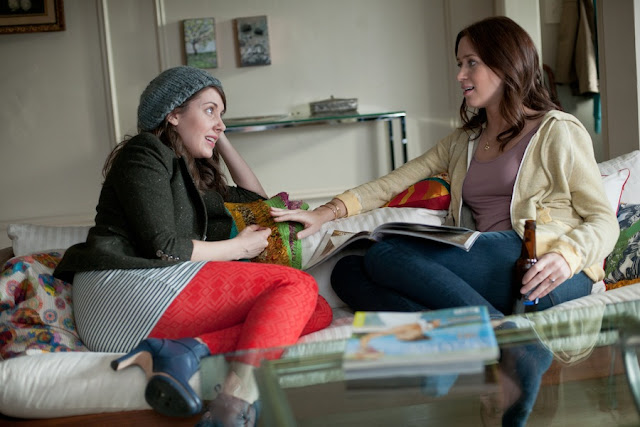 |
| Sisters Suzie (Alison Brie) and Violet (Emily Blunt) |
Guest Writer Wednesday: "Love" Is "Actually" All Around Us (and Other Not-So-Deep Sentiments)
 |
| Movie poster for the romantic comedy Love Actually |
———-
In the case of Love Actually, the Theseus/Hippolyta’s wedding is Christmas – or, arguably, the terminal at Heathrow Airport – and the three sets of main characters become nine sets of characters, and the themes of magic/love triangles/deception is whittled down to a Captain Obvious statement about love: “Love is actually all around us.”
Wow. Really? Love is everywhere, movie? Really?
The problem for me is that the only stories that worked for me were the ones that ended on a sad note.
The sad-ending stories
Keira Knightley/Andrew Lincoln/Chiwetel Ejiofor
I felt nauseous all throughout Keira Knightley’s story because I knew Andrew Lincoln was in love with her, and I was afraid that she was going to leave her new husband Chiwetel Ejiofor for his best friend. I liked that it ended on a melancholy note after the cue card scene, where she only kissed him once – maybe as a thank you, or just an acknowledgment of his feelings for her – and then walked away to go back to her husband, and then Andrew Lincoln told himself, “Enough,” and resolved to get over her. She wasn’t going to leave her husband for him just because he had a grand romantic gesture, and he didn’t expect her to leave him. It worked.
Except I couldn’t shake the feeling that it’s more than a little weird and creepy to give any kind of grand romantic gesture to your best friend’s wife regardless of your expectations, especially when said best friend is only a few feet away.
But maybe I’m being too critical.
Two people who loved each other from afar for years after working together for years finally connect on a romantic night, except that romantic night is disrupted when Laura Linney has to go take care of her mentally ill brother.
That one scene in the hospital where her brother has a violent reaction, the doctors come to intervene, and she quietly gets her brother under control…yes, it got to me. Perhaps on a more personal level than I wanted it to.
Except I couldn’t shake the feeling of dissatisfaction that Laura Linney and Rodrigo Santoro never shared an onscreen conversation about that interrupted romantic night, and that I didn’t understand the depth of feeling he had for her.
But maybe I’m being too critical.
I liked that the movie didn’t show us how Emma Thompson and Alan Rickman’s marriage turned out. In the epilogue, I couldn’t tell if they were together and trying (and failing) to make it work, or if they were separated and keeping up a good front for the sake of their kids. I liked that she held him responsible for the almost-affair and didn’t lay all the blame on the homewrecker, but on the person who was actually responsible for being true to their relationship.
Except I couldn’t shake the annoyance that the homewrecking secretary character was literally dressed like a cleavage-showing devil in a red outfit at a Christmas party. Come on. Really?
But maybe I’m being too critical.
The happy-ending stories
Keep in mind that those were the stories I liked. As for the other ones?
I liked that Prime Minister Hugh Grant was mindful of keeping professional boundaries between himself and the junior assistant he loved at first sight. I liked that he never overstepped his bounds and in fact had her transferred to a different job so he could uphold those professional boundaries. And, of course, I loved the dancing (although I prefer this dancing as far as Hugh Grant Dancing clips go). What I didn’t like was the unnecessary “Sexual Harassment from the American President” sidebar. It was unnecessarily political for a Christmas movie/rom-com (and somehow still had nothing to do with politics), it was a cheap American stereotype, and worst of all, it introduced a moment of sexual harassment for the sole purpose of giving the male character a Hero Moment.
Really, Love Actually? We needed a “I shall stand up against sexual harassment!” moment to see what a good guy he was? I guess it was a sign that his love for Martine McCutcheon was for real, but, well, I would hope that Our Hero would stand up for any of his employees that were being sexually harassed, not just the ones he happens to fancy.
Liam Neeson/son
First of all, watching this story was totally uncomfortable, given that Liam Neeson is playing a widower. But it’s not the movie’s fault that his real-life wife tragically died two years ago.
It is the movie’s fault that I got absolutely no sense of grief from Liam Neeson’s stepson for his mother. I get what the writers were going for – the little boy fixates on a girl his age named Joanna (his mother’s name) because he’s focusing on the one person/thing that makes him happy after his mother died. But even if that’s what the movie was going for, it’s not what I felt. What I felt was that the boy’s mother’s death was completely incidental to his life. “Mom’s dead, yeah, whatever, this American girl in my school is really cute.”
Too bad. There was real potential to explore how a stepfather and stepson might come together in shared grief for a wife and mother they both loved.
Colin Firth/Not Elizabeth Bennet
I’m sorry, but how many romantic cliches can happen in one storyline? The papers float into the water, so Not Elizabeth Bennet HAS to strip down in slow-motion while Colin Firth watches in amazement? The proposal in broken Portuguese and the acceptance in broken English? The “Hey, we’re having the same conversation and are TOTES ON THE SAME WAVELENGTH!” conversation while they speak in different languages?
And let’s not forget the delightful fake-out where Colin Firth goes to his beloved’s father to ask for her hand, and he hilariously confuses Colin Firth’s intentions, thinking that Colin Firth intends to marry the other daughter – and then we see that the other daughter is more than a size 4 and not Hollywood beautiful! LOL at the idea that the fat cow could find love with anyone, much less Mr. Darcy!
(Incidentally, I’m calling Lucia Moniz’s character Not Elizabeth Bennet only because I have a hard time seeing Colin Firth as anyone but Mr. Darcy. That is not the movie’s fault, or Lucia Moniz’s fault, or Colin Firth’s fault, for that matter.)
The comic relief stories
Meanwhile, there were three other storylines that are roughly the equivalent of “the mechancials put on a play for Theseus and Hippolyta.”
Martin Freeman/Joanna Page
I could have watched a whole movie about two body doubles finding love while they simulate sex with each other onscreen. Curse the DVD for skipping during one of their most important scenes.
Some dude goes to America to pick up chicks
Pretty self-explanatory. Praise the DVD for skipping during one of those crucial scenes.
Bill Nighy is an aged rocker who’s cynical about love
He’s cynical about romance but realizes he had love all along in the beleaguered assistant who puts up with his crap. He’s the most cynical character in the movie, and yet he inspires the least amount of cynicism in me, the viewer – that is, no cynicism at all. I have no complaints about this storyline. I loved it.
My verdict
Love Actually had a few effective comedic and dramatic moments. I appreciate the hilarity of Emma Thompson’s daughter proudly announcing that she got the part of “First Lobster” at her school’s nativity play, and I was moved by Emma Thompson trying not to cry during Joni Mitchell’s “Both Sides Now.” Keep in mind, though, that Emma Thompson is one of those performers who never fails to move me no matter what the circumstances.
The movie as a whole, though? The stories that worked for me were the ones that either ended sadly, or were played for pure comedy with no tragicomic or dramatic elements. If the movie wants me to believe that “love actually is all around us,” I don’t think it worked.
———-
‘Friends with Kids:’ Witty & Touching…But Is It a Feminist Extravaganza?
 |
| Adam Scott and Jennifer Westfeldt in ‘Friends with Kids’ |
“…I’ve never understood why things always have to be just one way when I’ve seen so many people in my life struggle tremendously to fit into those boxes or to live up to those expectations or pressures put upon them by whatever society’s concept of ‘normal’ is…I’m frustrated by things that are exclusive to one particular life choice…I think that, in all three of my films, I’ve been trying to explore these different milestones, and the idea that there are a lot of valid ways to live your life and make decisions to find happiness on your own terms.”
‘Friends with Kids’: Witty & Touching…But Is It a Feminist Extravaganza?
 |
| Adam Scott and Jennifer Westfeldt in ‘Friends with Kids’ |
“…I’ve never understood why things always have to be just one way when I’ve seen so many people in my life struggle tremendously to fit into those boxes or to live up to those expectations or pressures put upon them by whatever society’s concept of ‘normal’ is…I’m frustrated by things that are exclusive to one particular life choice…I think that, in all three of my films, I’ve been trying to explore these different milestones, and the idea that there are a lot of valid ways to live your life and make decisions to find happiness on your own terms.”
Guest Writer Wednesday: Guilty Pleasures: Practical Magic (1998)
 |
| Sandra Bullock as Sally Owens in Practical Magic |
 |
| Stockard Channing as Aunt Frances and Dianne Wiest as Aunt Bridget |
 |
| Goran Visnjic as Jimmy Angelov (really) and Nicole Kidman as Gillian Owens |
 |
| Bullock and Aidan Quinn |
 |
| That House! |
 |
| That kitchen! |
 |
| The greenhouse! |
 |
| Sisters Sally (Bullock) and Gilly (Kidman) |
 |
| The Aunts (Wiest and Channing) |
For Sally it is. “Do you swear?” she asks her sister.
 |
| Sally |
In the end I think it is that female closeness that gets me about this film and which makes me slightly embarrassed to admit it — because I suspect that by using some kind of dark magic, the filmmakers cooked up a heady brew of fine men-folk, house porn, and scenes like Midnight Margaritas explicitly to fly under my critical radar and keep bringing me back. I fear my uncritical affection for this film because it feels manipulative to me, not a genuine dedication to women’s relationships and good houses above & beyond women’s relationship to men. I feel embarrassed that what I had long believed was an unrealistic and slightly embarrassing fantasy — that my friends and I would all grow old together — has been packaged into a very pretty filmic production for me to watch. Shouldn’t I feel all the more guilty about this pleasure?
 |
| Sally and her daughters |
 |
| Joan Crawford in Johnny Guitar |
 |
| Yes, there is a romantic happy ending. |
I see it as metaphorical. This is about women’s power — and their power in numbers. I may be trying very hard here to stop feeling so guilty about my appreciation for this film, but this works for me:
- terrific cast
- eminently likeable lead
- great range of attractive men-folk
- fantastic house
- rich portrayals of women’s relationships
- the movie facilitates queer readings against and/or alongside its mainstream messages
- it’s about women’s power, and their power in numbers
I welcome your thoughts, quibbles, and good-natured derision for my poor taste in film!
Top 10 of 2011: Rom-Coms Don’t Suck
Sunday Recap
Bitch Flicks’ Weekly Picks: pieces from Racialicious, The Crunk Feminist Collective, About-Face, Pandagon, etc.
‘Pray the Devil Back to Hell’ Portrays How the Women of Liberia, United in Peace, Changed a Nation: As the war progressed, the women wanted to take more drastic measures. Inspired by their faith, the women donned white garb to declare to people they stood for peace. Thousands of women protested at the fish market each and every day, a strategic location visible to Taylor. Carrying a huge banner stating, “The women of Liberia want peace now.” It was the first time in Liberia’s history where Christian & Muslim women came together.
Why Should Men Care? An Interview with Matt Damon: “Why I wanted to do Women, War & Peace was because I thought it said something really important about the nature of war and the nature of the experience of women. And—as a guy who’s raising four girls—that matters to me. It matters to me anyway, but that makes it matter to me more.” — Matt Damon
Guest Writer Wednesday: A Review in Conversation of Twin Peaks: We have both admitted to fondness for the more fringe female characters like the Log Lady, Nadine, and Lucy, but they, and all the other women, really only exist according to their relationships with men.
Guest Writer Wednesday: Why Watch Romantic Comedies?: The romantic comedy genre gets a lot of flak. It’s considered a genre that’s more “shallow” than drama, but not funny enough to be a “real” comedy. Is it any coincidence that the romantic comedy is one of the few film genres, and possibly the only film genre, that regularly features women?
Why Facebook’s “Occupy a Vagina” Event Is Not Okay [TW for discussions of rape and sexual assault]: It’s important to note that even the language–occupy a vagina–divorces women from their own bodies. It’s a form of dismemberment, and I’ll say it again: we live in a rape culture, a culture that reduces women to body parts, whether it’s to sell a product, to promote a film, or for nothing more than reinforcing (and getting off on) patriarchal power. When we use language that prevents us from seeing a person as a whole human being, language that encourages us to view women in particular as a collection of body parts designed for male pleasure (e.g. occupy a vagina), then she exists as nothing more than an object, a fuck-toy, sexually available by default. It might not have been the intent of the event creator to participate in women’s subjugation, but it’s certainly the fucking reality.
Swiffer Reminds Us That Women Are Dirt: It’s remarkable how different the portrayals of the dirt people are: the men-as-dirt ads show a Crocodile Dundee-esque character (also stereotypical) and two buddies lamenting the state of their romantic lives, while the women-as-dirt ads always show a lonely, solitary woman desperate for the kind of attention provided by this wonder mop.
Some Scattered Thoughts on Detective Shows and Geniuses: I’m at a bit of a disadvantage in discussing Medium because I’m only familiar with the first season. Perhaps things get better for Allison in later seasons. Perhaps the men in her life stop expressing so much condescension and distrust toward her and endow her with some Lightman- and/or Monk-esque respect. Perhaps she no longer feels compelled to apologize for her own idiosyncratic crime-solving abilities and develops Lightman’s uber-masculine arrogance about it. (But don’t take that confidence too far, Allison—no one wants to work with a bitch.) At the very least, in the first season of Medium, I sort of love her husband. I mean when is a male rocket scientist ever the sidekick, hmmm?
Guest Writer Wednesday: Why Watch Romantic Comedies?
 |
| some romantic comedies |
This guest post by Lady T previously appeared at her blog The Funny Feminist.
I also think that looking at romantic comedies is a worthwhile feminist project. I want to look at how men and women are represented in these films. I want to look at the way romantic expectations are presented in our popular culture. I want to look at issues of consent. I want to look at the way the comedy genre affects the romance genre and vice-versa.
For the parody or spoof film genre, the entry lists three examples. 0 of 3 of these examples have female protagonists.
For the anarchic comedy film genre, the entry lists two examples. 0 of 2 of these examples have female protagonists.
For the black comedy film genre, the entry lists fourteen examples. 1 of these 14 examples (Heathers) has a female protagonist without a male co-protagonist, and fewer than half have a female co-protagonist.
I think you can all start to see the pattern here, but let me continue just to belabor the point.
Action comedy films. 9 examples, 0 female protagonists.
Comedy horror films. 9 examples, 1 female protagonist (in Scary Movie).
Fantasy comedy films. 6 examples, 2 female co-protagonists (The Princess Bride, Being John Malkovich), 0 female protagonists without male co-protagonists.
Black comedy films. 3 examples, 0 female protagonists.
Sci-fi comedy films. 8 examples, 0 female protagonists.
Military comedy films. 9 examples, 1 female protagonist (Private Benjamin).
Stoner films. 4 examples, 0 female protagonists.
Some might argue with me on particular examples, but it’s obvious that dominant characters in comedy films are overwhelmingly male. (I also understand that Wikipedia is not an entirely accurate source of information, but the examples that are used to represent these different genres explains a lot about our cultural attitudes.)
If you look at the entry on romantic comedies, you see many more films that have female protagonists, or at least female co-protagonists. Especially significant is the list of top-grossing romantic comedies. 22 films are listed. More than half of them have female co-protagonists, some have one female protagonist, and one has (gasp!) more than one female protagonist (Sex and the City).
—-
Guest Writer Wednesday: Rom-Coms Don’t Suck
(95) Minutes of Pure Torture: 500 Days of Summer, Take 2

